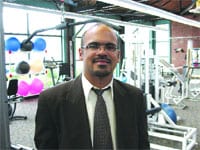Fallon Health Celebrates Historic PACE Milestone
WORCESTER — Fallon Health, a not-for-profit healthcare-services organization, recently celebrated a historic milestone in the growth of community-based care for seniors. With Fallon’s opening of four new programs this month, the number of Programs of All-inclusive Care for the Elderly (PACE) now exceeds 100 nationwide.
PACE, which was developed in San Francisco in the 1970s, helps to keep nursing-home-eligible elders living in the community.
“The story of PACE is a rarity in today’s healthcare-policy environment,” said Shawn Bloom, president and CEO of the National PACE Assoc. “PACE is a common-sense approach to providing care to older people that was rigorously studied and tested and then able to become a permanent part of our healthcare system. We don’t often see successful innovations allowed to thrive and grow like PACE.”
PACE programs bring together a coordinated team of doctors, nurses, social workers, and therapists to provide seniors with an individualized care plan that addresses each person’s unique medical care and social needs. The result is higher-quality care and far more favorable outcomes compared to traditional care options. More than 90{06cf2b9696b159f874511d23dbc893eb1ac83014175ed30550cfff22781411e5} of PACE enrollees reside outside of nursing homes.
“In Massachusetts, Fallon Health is proud to have led the way in senior-care services with our PACE program, Summit ElderCare, which we’ve offered for the last 19 years,” said Richard Burke, the company’s president of Senior Care Services and Government Affairs. “Today, Summit ElderCare is the largest PACE organization in New England and the fifth-largest in the nation.”
Added Dr. David Wilner, Summit ElderCare’s medical director, “Fallon’s PACE program has helped thousands of individuals and their families by providing an innovative way to keep older individuals in the community for as long as possible.”
The PACE model was developed in the 1970s in San Francisco by On Lok, a community-based organization serving Chinese and Italian-American neighborhoods. Marie-Louise Ansak, a healthcare consultant, developed the model with the goal of allowing elders to remain in their communities for as long as possible. The PACE model was so successful, it was studied by the state of California and federal healthcare-policy officials.
Support from the Robert Wood Johnson Foundation and the John A. Hartford Foundation led to the development of a Medicare demonstration project, and start-up funds were made available for different types of sponsors to develop PACE in their communities. Fallon Health was one of the first health insurers in the country to participate.
The success of 15 PACE replication programs led Congress to pass legislation creating PACE as a permanent provider type as part of the Balanced Budget Act of 1997. President Obama’s 2015 budget proposal seeks to extend the role of PACE by calling on Congress to create a PACE pilot program for people under age 55 who need long-term services and supports.
PACE is unique because it integrates care delivery by directly providing all medically necessary care and services through an interdisciplinary team, transportation system, and PACE center. Using a bundled-payment model, PACE serves high-need, high-cost individuals who require daily, hands-on care.
There are now 103 PACE organizations operating in 31 states. As the only health plan in Massachusetts that is both an insurer and a provider of care, Fallon Health operates its PACE program in six locations in the Commonwealth: Springfield, Worcester (two sites), Charlton (two locations), and Leominster. For more information, visit summiteldercare.org.


Comments are closed.